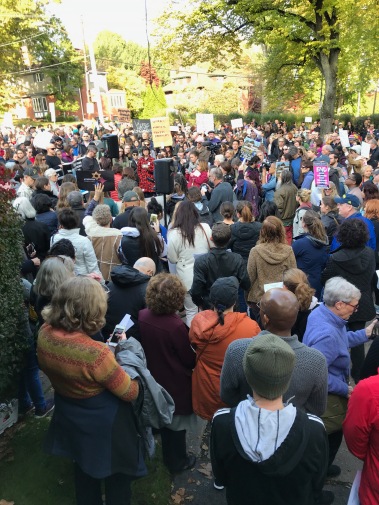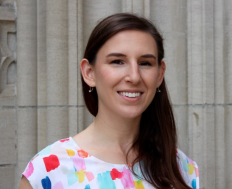Thoughts on Reading and Making History in the Wake of Tree of Life
By Avigail Oren
This piece is part of the second installment of Speaking Justice to Power: Local Pittsburgh Scholars Respond to the Tree of Life Shooting, a series edited by Heath Cabot and Michal Rose Friedman.

I experienced the events and aftermath of the Tree of Life shooting as a historian just as much as I did as a Jew and a resident of Pittsburgh. My expertise is in postwar American Jewish history, and I wrote a dissertation about pluralism in urban Jewish Community Centers in the 1960s and 1970s. My archival research made me painfully aware of the ways in which white-identified Jews avoided conversations about their growing racial privilege and ignored their role in upholding white supremacy, even as they reliably voted Democrat and championed policies protecting minority rights. These findings led me to dismiss any and all arguments that antisemitism was a major issue for Jews in America. I firmly believed—and still do—that the central struggle of our time is to uproot global systems of racial discrimination against black, indigenous, and other peoples of color (including Jews of Color). But the bullets fired at Tree of Life shattered the explanations of the world that I had carefully constructed as a historian and forced me to gaze at the past and present through new lenses, ones that foreground the endurance of antisemitism in American society and its centrality in white nationalist ideology.
I say this not to make a point about the rightness and wrongness of my historical interpretations. My old and new perspectives are debatable, and indeed they are shifting. My point is this: it is difficult to be reflexive about one’s own reasoning. French historian Marc Bloch, writing on methods for determining historical causation, noted the ease with which scholars accepted the reasoning of historical actors. “[W]hat a curious contradiction there is in the successive attitudes of so many historians,” Bloch wrote, explaining that “when it is a question of ascertaining whether or not some human act has really taken place, they cannot be sufficiently painstaking.” And yet, he lamented, “If they proceed to the reasons for that act, they are content with the merest appearance, ordinarily founded upon one of those maxims of commonplace psychology which are neither more or less true than their opposites” (195). My experience is that this assessment is just as accurate when turned inwards onto our own personal thinking and behavior.
The shooting at Tree of Life revealed a dissonance between what I intellectually knew and what I viscerally felt about the scholarly study of the past. When centuries of antisemitism crept into my present, I was surprised to find that I (falsely) believed that the present was apart from history. In the deepest recesses of my mind, in that lizard brain that rules us when the academic brain runs out of gas, the present was a terminal point in constant motion and thus objective, separate, and different from the past. This unconscious rift led me to undermine the historical importance of antisemitic ideology in sustaining white nationalism. The shooting collapsed this internal dissonance, zipping past and present back together.
At such moments of personal and political upheaval, when the foundations are shaking below me, I often turn to Marc Bloch’s canonical book on methodology, The Historian’s Craft. The week before the Tree of Life shooting I published an essay on my blog that I had been writing, on and off, since I reread The Historian’s Craft in the summer of 2016 during the Republican National Convention; I was discouraged that the GOP’s leading candidate lied again and again and no amount of fact checking reduced his popularity. The Right was succeeding in bending history to their ends, and then undermining historians’ rebuttals and corrections by tarring us as “elitist” and “out of touch.” I hoped that The Historian’s Craft could help me and my readers reevaluate our methods of engaging in public intellectualism during this moment of political upheaval.
In the essay I focused on a particular line in which Bloch warned, “If the judgment only followed the explanation, the reader could simply skip it. Unfortunately the habit of passing judgments leads to a loss of taste for explanations” (140). I read this to mean that scholars should be wary of making arguments that prove their contemporary relevance, placing them at risk of becoming pundits rather than public educators. By defending their relevance, historians undermine their own legitimacy and, worse, miss an opportunity to explain and to tell stories that people understand because their complexity is relatable and authentic. My point was not to use Bloch to urge objectivity; rather, I turned to methodology to find an answer for how activist historians could speak truth to power without cutting their own legs out from underneath them.
I was also compelled to reread the book in 2016 because it was written in Vichy France in the midst of World War II. In addition to being a French citizen and a historian of medieval and early-modern French feudal society, Marc Bloch was a Jew. In 1940, after Nazi troops invaded France, Bloch went into hiding and eventually became active in the French Resistance. It was then, in the resistance, when he was no longer ‘doing History,’ that he began writing The Historian’s Craft. Bloch was writing the book at a moment when fascist regimes were revising history to place Jews at the center of economic and imperial decline, and when Europeans were wondering whether, after the first World War, they had “done well in trying to learn from the past, and whether [they had] learned rightly.” (Vichy police eventually captured Bloch in 1944 and he was turned over to the Gestapo, who murdered him by firing squad. After the war the historian Lucien Febvre, Bloch’s close friend and colleague, took up the task of assembling the unfinished text into a draft for publication.)

Writing about The Historian’s Craft was a useful exercise in reconciling my professional life with my politics. But I turned to Bloch again in the weeks after the shooting because I felt a dissonance between my activism and my (ideal) historical practice. As a member of the steering committee of Bend the Arc: Pittsburgh, I contributed to the open letter urging the president to reject white nationalism and participated in the Pittsburgh Loves All Our Neighbors march. I have since poured myself into activism on immigration issues, particularly with the #DefundHate campaign. I enter into this work as a historian; my activism is inseparable from my historical consciousness. However, I am engaging in partisan activities that often pass judgment and simplify complex situations to inspire people to take action. Such strategies are inconsistent with the methodology I learned from Bloch: “Even in action we are far too prone to judge. … A little more understanding of people would be necessary merely for guidance, in the conflicts which are unavoidable; all the more to prevent them while there is yet time” (143-4). While the shooting zipped together past and present in my conscious mind, it unzipped the relationship between my historical practice and my activism.

Since then, I have become more focused on judgments and explanations in my scholarship and further drawn to this sentiment expressed by Bloch: “When the passions of the past blend with the prejudices of the present, human reality is reduced to a picture in black and white” (140). Robert Bowers saw the world in black and white, but I also allowed myself to flatten the world as a result of my understanding of history and my own place within it. So as a historian I’m committing to the words with which Blochconcluded The Historian’s Craft, though not by his choice: “in history, as elsewhere, the causes cannot be assumed. They are to be looked for…” (197).
As an activist, I will continue to do what I feel is right to achieve progressive victories. But even in doing so, Bloch remains in my thoughts. I will never again pick up The Historian’s Craft as just a professional text. For me, it is now personal. It is a message of optimism from a French Jew to an American Jew; 75 years in the future Bloch and I are bound by profession and by peoplehood, by the thousands-year-long legacy of antisemitic persecution and our resistance to it.
 Avigail Oren is a historian and writer based in Pittsburgh, Pennsylvania. She earned her Ph.D. at Carnegie Mellon University, specializing in 20th century U.S. urban history. Her interests are in race relations and Jewish studies, as well as historical methodology. In 2017 she published a chapter in The Ghetto in Global History, edited by Wendy Z. Goldman and Joe W. Trotter, and more recently has written for Tropics of Meta and The Metropole, where she is co-editor.
Avigail Oren is a historian and writer based in Pittsburgh, Pennsylvania. She earned her Ph.D. at Carnegie Mellon University, specializing in 20th century U.S. urban history. Her interests are in race relations and Jewish studies, as well as historical methodology. In 2017 she published a chapter in The Ghetto in Global History, edited by Wendy Z. Goldman and Joe W. Trotter, and more recently has written for Tropics of Meta and The Metropole, where she is co-editor.
